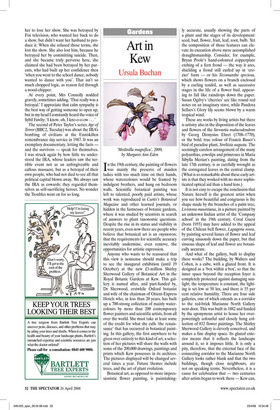Farewell, Foyle
Simon Hoggart
So it’s goodbye to Foyle’s War (Sunday, ITV), for the time being at least. The series seems to have been cancelled not because it was no good; it was, for a TV ’tec drama, superb. Nor because it had poor ratings — they were huge for today’s crowded television schedules. The reason seems to be that it had the wrong kind of viewers, people who remembered the war or, increasingly these days, people who were born to people who remembered the war. It is a given of marketing that the young are the only target advertisers should bother to attract, since they are deemed to flit from brand to brand like binge-drinking butterflies. Older people are presumed to be set in their ways. No doubt some are. But many are prepared to use their larger incomes to switch from one brand of car to another, to try new drinks, new toilet cleansers and new places to go on holiday. However, marketing is a ju-ju science, much like astrology, and its practitioners need to insist they are never wrong because if you examined their work carefully you would discover that they were rarely right.
There is talk that Foyle may be back in, no doubt, something called Foyle’s Austerity with episodes about stolen ration books and doctors who don’t want to join the NHS. I have a suggestion which might solve ITV’s conundrum. Have him take part in a reverse Life on Mars or Ashes to Ashes. Injured in a crash, hit amidships by an ancient Humber, he wakes up several decades in the future. Here he is shocked to discover the rules of modern policing, as well as coping with drug dealers and people traffickers in a world full of WKD cocktails and hedge-fund managers. I’d love to see him walk into an All Bar One wearing that Homburg and that overcoat.
The process is already under way, since this week some of the characters used dialogue ages before its time. I’ve bored on about this before, but since some viewers would write in if a single pip was misplaced on a uniform, I feel I have the right. In 1945 nobody ever said, ‘I’ll give it my best shot’, or, to an abandoned lover, ‘I want to take back the hurt.’ We said ‘peep’ and not ‘peek’. I suppose we should be grateful that now nobody will ever say, ‘We have issues with the German people.’ Shrink Rap (Monday, More4) was a very weird programme. It featured the comedian Joan Rivers, whose appearance proved that plastic surgery and botox offer soft, youthful skin at the terrible price of making you look hideous. ‘Oh, granny, why are your eyes almost on the sides of your head?’ At one point she said that, at the age of 74, she still had sex, ‘but the room’s a little darker’. I think most men would request a total blackout, and a blindfold, to be on the safe side.
The theme of her on-the-couch interview with the therapist Pamela Connolly, née Stephenson, was betrayal. It seems she has been betrayed by just about everyone. She could sniff out betrayal like a truffle hound. She had been betrayed by her old mentor Johnny Carson, who arranged for her to lose her show. She was betrayed by Fox television, who wanted her back to do a show, but didn’t want her husband to produce it. When she refused those terms, she lost the show. She also lost him, because he betrayed her by committing suicide. Then, and she became truly perverse here, she claimed she had been betrayed by her parents, who had built up her confidence then ‘when you went to the school dance, nobody wanted to dance with you’. That isn’t so much chopped logic, as reason fed through a wood-chipper.
At every point, Mrs Connolly nodded gravely, sometimes adding, ‘That really was a betrayal.’ I appreciate that calm sympathy is the best way of getting someone to open up, but in my head I constantly heard the voice of Sybil Fawlty: ‘I know, oh, I kno-o-o-ow ... ’ The second of Peter Taylor’s series Age of Terror (BBC2, Tuesday) was about the IRA’s bombing of civilians at the Enniskillen remembrance day service in 1987. It was an exemplary documentary, letting the facts — and the survivors — speak for themselves. I was struck again by how little we understood the IRA, whose leaders saw the terrible event not as an unforgiveable and callous massacre, but as a betrayal of their own people, who had not died to see all that political capital blown away. We always saw the IRA as cowards; they regarded themselves as self-sacrificing heroes. No wonder the Troubles went on for so long.











































































 Previous page
Previous page